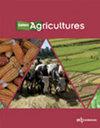The invisibility of young people in family farming: a gender perspective in the semi-arid region of Ceará, Brazil
IF 1.1
4区 农林科学
Q3 AGRICULTURE, MULTIDISCIPLINARY
引用次数: 1
Abstract
The evolution of family farming cannot be analyzed only from the perspective of production. Since it is also a kinship unit, the family farm reveals social tensions that contribute to the migration of young people, especially for young women. This study presents an analysis of the factors that contribute to this migratory process, considering youth and gender variables. The analysis is based on a participatory diagnosis, multisectoral interviews and surveys in thirty-three communities located in the center of the Ceará State (Northeastern Brazil). The research reveals that the main factor of this migratory process is the lack of appreciation of family farming by the qualified rural youth, who participate little in decision-making. When the analysis of the migration is gender-focused, the invisibility of young women productive and reproductive work stands out as the main driver of migration to urban areas and proves to be greater than for young men. Rural youth migration will shape the rural territory and will probably change the format of family farming. Understanding its factors may help to propose public policies more adapted for family farming.家庭农业中年轻人的隐形:巴西塞埃尔半干旱地区的性别视角
家庭农业的演变不能只从生产的角度来分析。由于家庭农场也是一个亲属单位,因此它揭示了社会紧张局势,这种紧张局势助长了年轻人,特别是年轻妇女的移徙。本研究分析了促进这一移徙过程的因素,考虑到青年和性别变量。该分析基于在塞埃尔州中部(巴西东北部)33个社区进行的参与性诊断、多部门访谈和调查。研究发现,这一迁移过程的主要因素是有条件的农村青年对家庭农业缺乏认识,他们很少参与决策。当对移徙的分析以性别为重点时,青年妇女不从事生产性和生殖工作是向城市地区移徙的主要推动力,而且证明其作用比青年男子更大。农村青年移民将塑造农村地区,并可能改变家庭农业的形式。了解其因素可能有助于提出更适合家庭农业的公共政策。
本文章由计算机程序翻译,如有差异,请以英文原文为准。
求助全文
约1分钟内获得全文
求助全文
来源期刊

Cahiers Agricultures
农林科学-农业综合
CiteScore
2.00
自引率
22.20%
发文量
23
审稿时长
3 months
期刊介绍:
Cahiers Agricultures is a - mainly - French language scientific journal on world farming systems, how they are changing and their role in society. It is aimed at all those – researchers, field workers, teachers – who are interested in a holistic reflection on the agricultural world.
Cahiers Agricultures gives priority to research on agriculture as implemented by farmers, that has meaning for citizens in countries in the North and South, as opposed to research work conducted in a controlled environment (laboratory, research center, etc.). Research of this type is often multidisciplinary and takes into account the knowledge and know-how of the different stakeholders. The different parties are also actively involved in research, alongside the scientists. In this way, the journal stimulates debate on issues linked to society, such as the impact of using water and nitrogen fertilisers, peri-urban farming, fish farming, livestock production in rural areas, food security, etc.
 求助内容:
求助内容: 应助结果提醒方式:
应助结果提醒方式:


